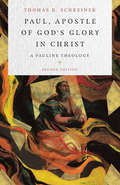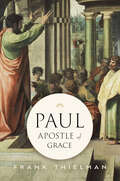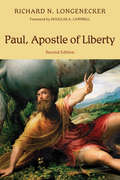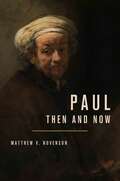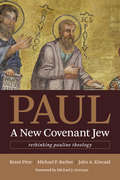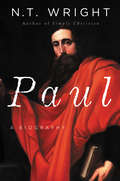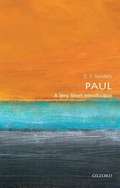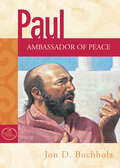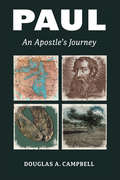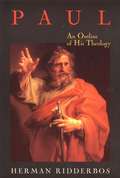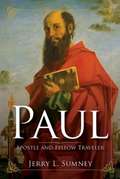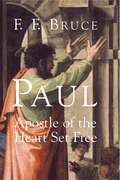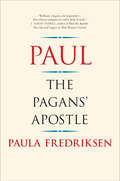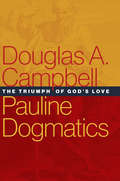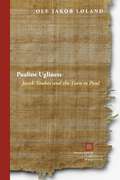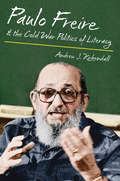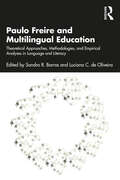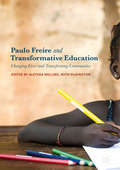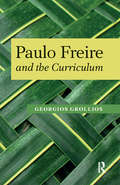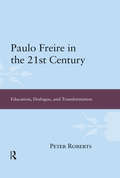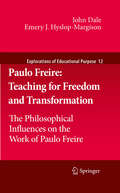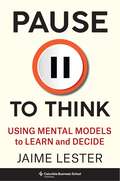- Table View
- List View
Paul, Apostle of God's Glory in Christ: A Pauline Theology
by Thomas R. SchreinerThe theology of the apostle Paul is complex, set forth in numerous occasional letters, and subject to a seemingly endless variety of interpretations. How should students of Scripture engage the challenging task of discerning the shape of Paul's thought?Paul, Apostle of God's Glory in ChristPaul, Apostle of God's Glory in Christ
Paul, Apostle of Grace
by Frank ThielmanAn engaging and accessible introduction to the life and world of Paul In this fresh and engaging survey, Frank Thielman introduces readers to the life and world of the apostle Paul. Drawing on the Acts of the Apostles and Paul&’s canonical letters as well as noncanonical sources and archaeological records, Thielman constructs a vivid picture of the complex historical period and fascinating cultures in which Paul worked. At the same time, Thielman guides readers toward a deeper understanding of who Paul was, what he believed, and how he carried out his ministry. Solidly grounded in Paul&’s own writings as well as scholarly research, the book explores a wide range of compelling questions: What drove Paul to endure often treacherous journeys of hundreds of miles to establish like-minded communities around the world as he knew it? What spurred him to recruit a network of co-workers who were willing to help him in this vast project? What kept him at the task even when it landed him in prison? What prompted him to produce a body of letters to these communities of such depth that millions of people still read them with profit today? Addressing these questions through careful and conservative research, Paul, Apostle of Grace is a worthy successor to F. F. Bruce&’s classic study and an essential resource for scholars and students of the Bible today.
Paul, Apostle of Liberty: The Origin And Nature Of Paul's Christianity
by Richard N. LongeneckerPaul’s teachings are vital to the Christian gospel, so the turbulent, long-running debate over how to interpret Paul’s message is crucially important. Richard Longenecker’s Paul, Apostle of Liberty has long stood — and still stands — as a significant, constructive, evangelical study of Paul’s theology, especially of the creative tension between law and liberty that runs throughout his thought. When this book was originally published in 1964, Longenecker then presciently anticipated several subsequent debates, addressing many of the same questions that such scholars as E. P. Sanders and Richard Hays did years later. This second edition of Paul, Apostle of Liberty includes a substantial foreword by Douglas Campbell and a lengthy addendum by Longenecker discussing the major developments in Paul studies over the past fifty years.
Paul, Apostle of Liberty: The Origin And Nature Of Paul's Christianity
by Richard N. LongeneckerPaul&’s teachings are vital to the Christian gospel, so the turbulent, long-running debate over how to interpret Paul&’s message is crucially important. Richard Longenecker&’s Paul, Apostle of Liberty has long stood — and still stands — as a significant, constructive, evangelical study of Paul&’s theology, especially of the creative tension between law and liberty that runs throughout his thought. When this book was originally published in 1964, Longenecker then presciently anticipated several subsequent debates, addressing many of the same questions that such scholars as E. P. Sanders and Richard Hays did years later. This second edition of Paul, Apostle of Liberty includes a substantial foreword by Douglas Campbell and a lengthy addendum by Longenecker discussing the major developments in Paul studies over the past fifty years.
Paul, Then and Now
by Matthew V. NovensonReckoning with the hermeneutical struggle to make sense of Paul as both a historical figure and a canonical muse. Matthew Novenson has become a leading advocate for the continuing relevance of historical-critical readings of Paul even as some New Testament scholars have turned to purely theological or political approaches. In this collection of a decade&’s worth of essays, Novenson puts contextual understandings of Paul&’s letters into conversation with their Christian reception history. After a new, programmatic introductory essay that frames the other eleven essays, Novenson explores topics including:the relation between theology and historical criticismthe place of Jews and gentiles in Paul&’s gospelPaul&’s relation to Judaismthe relevance of messianism to Paul&’s ChristologyPaul&’s eschatology in relation to ancient Jewish eschatologiesthe aptness of monotheism as a category for understanding antiquitythe reception of Paul by diverse early Christian writersthe peculiar place of Protestantism in the modern study of Paulthe debate over the recent Paul-within-Judaism movementanti-Judaism in modern New Testament scholarshipdisputes over Romans and Galatiansthe meta-question of what it would mean to get Paul right or wrong Engaging with numerous schools of thought in Pauline studies—Augustinian, Lutheran, New Perspective, apocalyptic, Paul-within-Judaism, religious studies, and more—while also rising above partisan disputes between schools, Novenson illuminates the ancient Mediterranean context of Paul&’s letters, their complicated afterlives in the history of interpretation, and the hermeneutical struggle to make sense of it all.
Paul, a New Covenant Jew: Rethinking Pauline Theology
by Brant Pitre Michael P. Barber John A. KincaidAfter the landmark work of E. P. Sanders, the task of rightly accounting for Paul's relationship to Judaism has dominated the last forty years of Pauline scholarship. Pitre, Barber, and Kincaid argue that Paul is best viewed as a new covenant Jew, a designation that allows the apostle to be fully Jewish, yet in a manner centered on the person and work of Jesus the Messiah. This new covenant Judaism provides the key that unlocks the door to many of the difficult aspects of Pauline theology.Paul, a New Covenant Jew is a rigorous, yet accessible overview of Pauline theology intended for ecumenical audiences. In particular, it aims to be the most useful and up to date text on Paul for Catholic Seminarians. The book engages the best recent scholarship on Paul from both Protestant and Catholic interpreters and serves as a launching point for ongoing Protestant-Catholic dialogue.
Paul, a New Covenant Jew: Rethinking Pauline Theology
by Brant Pitre Michael P. Barber John A. KincaidAfter the landmark work of E. P. Sanders, the task of rightly accounting for Paul's relationship to Judaism has dominated the last forty years of Pauline scholarship. Pitre, Barber, and Kincaid argue that Paul is best viewed as a new covenant Jew, a designation that allows the apostle to be fully Jewish, yet in a manner centered on the person and work of Jesus the Messiah. This new covenant Judaism provides the key that unlocks the door to many of the difficult aspects of Pauline theology.Paul, a New Covenant Jew is a rigorous, yet accessible overview of Pauline theology intended for ecumenical audiences. In particular, it aims to be the most useful and up to date text on Paul for Catholic Seminarians. The book engages the best recent scholarship on Paul from both Protestant and Catholic interpreters and serves as a launching point for ongoing Protestant-Catholic dialogue.
Paul: A Biography (The\new Testament For Everyone Ser.)
by N. T. WrightIn this definitive biography, renowned Bible scholar, Anglican bishop, and bestselling author N. T. Wright offers a radical look at the apostle Paul, illuminating the humanity and remarkable achievements of this intellectual who invented Christian theology—transforming a faith and changing the world.For centuries, Paul, the apostle who "saw the light on the Road to Damascus" and made a miraculous conversion from zealous Pharisee persecutor to devoted follower of Christ, has been one of the church’s most widely cited saints. While his influence on Christianity has been profound, N. T. Wright argues that Bible scholars and pastors have focused so much attention on Paul’s letters and theology that they have too often overlooked the essence of the man’s life and the extreme unlikelihood of what he achieved.To Wright, "The problem is that Paul is central to any understanding of earliest Christianity, yet Paul was a Jew; for many generations Christians of all kinds have struggled to put this together." Wright contends that our knowledge of Paul and appreciation for his legacy cannot be complete without an understanding of his Jewish heritage. Giving us a thoughtful, in-depth exploration of the human and intellectual drama that shaped Paul, Wright provides greater clarity of the apostle’s writings, thoughts, and ideas and helps us see them in a fresh, innovative way.Paul is a compelling modern biography that reveals the apostle’s greater role in Christian history—as an inventor of new paradigms for how we understand Jesus and what he accomplished—and celebrates his stature as one of the most effective and influential intellectuals in human history.
Paul: A Very Short Introduction
by E. P. SandersMissionary, theologian, and religious genius, Paul is one of the most powerful human personalities in the history of the Church. E.P. Sanders, an influential Pauline scholar, analyzes the fundamental beliefs and vigorous contradictions in Paul's thought, discovering a philosophy that is less of a monolithic system than the apostle's convictions would seem to suggest. This volume offers an incisive summation of Paul's career, as well as his role in the development of early Christianity. Both lucid and judicious, it is the most compelling short introduction to Paul now available.
Paul: Ambassador of Peace (God's People)
by Jon D BuchholzWho was Paul in the Bible?See how a powerful and loving Savior transformed his most vigorous adversary into his greatest missionary.Paul’s travels were full of danger, heartache, disappointment, and physical abuse, but they were also full of exhilarating joy over the gospel’s power to change hearts.If you’re wondering who Paul was, or want to know how Paul’s faith journey impacts your own, this book is for you!Paul is part of the God’s People series by Northwestern Publishing House. It’s a wonderful collection about the lives and times of some of God’s chosen people. Plots and settings have been taken directly from the Bible, and each book features beautifully detailed, full-color illustrations.
Paul: An Apostle's Journey
by Douglas A. CampbellDouglas Campbell has made a name for himself as one of Paul’s most insightful and provocative interpreters. In this short and spirited book Campbell introduces readers to the apostle he has studied in depth over his scholarly career.Enter with Campbell into Paul’s world, relive the story of Paul’s action-packed ministry, and follow the development of Paul’s thought throughout both his physical and his spiritual travels.Ideal for students, individual readers, and study groups, Paul: An Apostle’s Journey dramatically recounts the life of one of early Christianity’s most fascinating figures—and offers powerful insight into his mind and his influential message.
Paul: An Outline of His Theology
by Herman RidderbosNow back in print in a beautiful new paperback edition, this study by one of Europe's foremost New Testament scholars provides a comprehensive exposition of the teaching of the apostle Paul. Firmly grounded in a careful exegesis of the biblical text and crafted with constant reference to the wealth of scholarly study of Paul's writings, this volume is a standard for interpreters of Paul's thought and all students of the New Testament.
Paul: Apostle and Fellow Traveler (Symposium Ser. #Vol. 16)
by Jerry L. SumneyCovering the entire Pauline corpus the reader finds a man who was adept at persuasive arguments and providing theological answers to real and, often, thorny congregational issues. Readers have a keen understanding of Paul’s place in the early church, the relationship between church and synagogue, and the relationship between the teaching of Paul and that of Jesus. These discussions set Paul firmly within the church that existed before he joined, finding that he became an adherent to much that preceded him.
Paul: Apostle of the Heart Set Free
by F. F. BruceWritten by one of the best known and most respected biblical scholars of all time, this illustrated volume explores all of the primary themes in Paul's thought as they developed in the historical context of his life and travels. While Bruce's primary concern is to portray the life of the apostle Paul, he also examines the main themes of Paul's thought, set in their historical background and illustrated from his letters. Originally published in 1977, this new paperback edition of Paul will be used with profit by all who have an interest in the primitive church--from general readers to the most advanced biblical scholar.
Paul: The Pagan's Apostle
by Paula FredriksenA groundbreaking new portrait of the apostle Paul, from one of today’s leading historians of antiquity Often seen as the author of timeless Christian theology, Paul himself heatedly maintained that he lived and worked in history’s closing hours. His letters propel his readers into two ancient worlds, one Jewish, one pagan. The first was incandescent with apocalyptic hopes, expecting God through his messiah to fulfill his ancient promises of redemption to Israel. The second teemed with ancient actors, not only human but also divine: angry superhuman forces, jealous demons, and hostile cosmic gods. Both worlds are Paul’s, and his convictions about the first shaped his actions in the second. Only by situating Paul within this charged social context of gods and humans, pagans and Jews, cities, synagogues, and competing Christ-following assemblies can we begin to understand his mission and message. This original and provocative book offers a dramatically new perspective on one of history’s seminal figures.
Paulette in Space
by Joan Fleiss Kaplan"These appealing decodable stories nurture early literacy development, which translates into building new readers' self-confidence. This, in turn, quickens the pace at which genuine reading comprehension is achieved ..."--Epsbooks.com.
Pauline Dogmatics: The Triumph of God's Love
by Douglas A. CampbellThe eschatological heart of Paul&’s gospel in his world and its implications for todayDrawing upon thirty years of intense study and reflection on Paul, Douglas Campbell offers a distinctive overview of the apostle&’s thinking that builds on Albert Schweitzer&’s classic emphasis on the importance for Paul of the resurrection. But Campbell—learning here from Karl Barth—traces through the implications of Christ for Paul&’s thinking about every other theological topic, from revelation and the resurrection through the nature of the church and mission. As he does so, the conversation broadens to include Stanley Hauerwas in relation to Christian formation, and thinkers like Willie Jennings to engage post-colonial concerns. But the result of this extensive conversation is a work that, in addition to providing a description of Paul&’s theology, also equips readers with what amounts to a Pauline manual for church planting. Good Pauline theology is good practical theology, ecclesiology, and missiology, which is to say, Paul&’s theology belongs to the church and, properly understood, causes the church to flourish. In these conversations Campbell pushes through interdisciplinary boundaries to explicate different aspects of Pauline community with notions like network theory and restorative justice.The book concludes by moving to applications of Paul in the modern period to painful questions concerning gender, sexual activity, and Jewish inclusion, offering Pauline navigations that are orthodox, inclusive, and highly constructive. Beginning with the God revealed in Jesus, and in a sense with ourselves, Campbell progresses through Pauline ethics and eschatology, concluding that the challenge for the church is not only to learn about Paul but to follow Jesus as he did.
Pauline Ugliness: Jacob Taubes and the Turn to Paul (Perspectives in Continental Philosophy)
by Ole Jakob LølandIn recent decades Giorgio Agamben, Alain Badiou, and Slavoj Žižek have shown the centrality of Paul to western political and philosophical thought and made the Apostle a central figure in left-wing discourses far removed from traditional theological circles. Yet the recovery of Paul beyond Christian theology owes a great deal to the writings of the Jewish rabbi and philosopher Jacob Taubes (1923–1987). Pauline Ugliness shows how Paul became an effective tool for Taubes to position himself within European philosophical debates of the twentieth century. Drawing on Nietzsche’s polemical readings of the ancient apostle as well as Freud’s psychoanalysis, Taubes developed an imaginative and distinct account of political theology in confrontations with Carl Schmitt, Theodor Adorno, Hans Blumenberg, and others. In a powerful reconsideration of the apostle, Taubes contested the conventional understanding of Paul as the first Christian who broke definitively with Judaism and drained Christianity of its political potential. As a Jewish rabbi steeped in a philosophical tradition marked by European Christianity, Taubes was, on the contrary, able to emphasize Paul’s Jewishness as well as the political explosiveness of his revolutionary doctrine of the cross.This book establishes Taubes’s account of Paul as a turning point in the development of political theology. Løland shows how Taubes identified the Pauline movement as the birth of a politics of ugliness, the invention of a revolutionary criticism of the ‘beautiful’ culture of the powerful that sides instead with the oppressed.
Paulo Freire & the Cold War Politics of Literacy
by Andrew J. KirkendallIn the twentieth century, illiteracy and its elimination were political issues important enough to figure in the fall of governments (as in Brazil in 1964), the building of nations (in newly independent African countries in the 1970s), and the construction of a revolutionary order (Nicaragua in 1980). This political biography of Paulo Freire (1921-97), who played a crucial role in shaping international literacy education, also presents a thoughtful examination of the volatile politics of literacy during the Cold War. A native of Brazil’s impoverished northeast, Freire developed adult literacy training techniques that involved consciousness-raising, encouraging peasants and newly urban peoples to see themselves as active citizens who could transform their own lives. Freire’s work for state and national government agencies in Brazil in the early 1960s eventually aroused the suspicion of the Brazilian military, as well as of U. S. government aid programs. Political pressures led to Freire's brief imprisonment, following the military coup of 1964, and then to more than a decade and a half in exile. During this period, Freire continued his work in Chile, Nicaragua, and postindependence African countries, as well as in Geneva with the World Council of Churches and in the United States at Harvard University. Andrew J. Kirkendall’s evenhanded appraisal of Freire’s pioneering life and work, which remains influential today, gives new perspectives on the history of the Cold War, the meanings of radicalism, and the evolution of the Left in Latin America. In the twentieth century, illiteracy and its elimination were political issues important enough to figure in the fall of governments (as in Brazil in 1964), the building of nations (in newly independent African countries in the 1970s), and the construction of a revolutionary order (Nicaragua in 1980). This political biography of Paulo Freire (1921-97), who played a crucial role in shaping international literacy education, also presents a thoughtful examination of the volatile politics of literacy during the Cold War. A native of Brazil’s impoverished northeast, Freire developed adult literacy training techniques that involved consciousness-raising, encouraging peasants and newly urban peoples to see themselves as active citizens who could transform their own lives. Freire’s work for state and national government agencies in Brazil in the early 1960s eventually aroused the suspicion of the Brazilian military, as well as of U. S. government aid programs. Political pressures led to Freire's brief imprisonment, following the military coup of 1964, and then to more than a decade and a half in exile. During this period, Freire continued his work in Chile, Nicaragua, and postindependence African countries, as well as in Geneva with the World Council of Churches and in the United States at Harvard University. Andrew J. Kirkendall’s evenhanded appraisal of Freire’s pioneering life and work, which remains influential today, gives new perspectives on the history of the Cold War, the meanings of radicalism, and the evolution of the Left in Latin America.
Paulo Freire and Multilingual Education: Theoretical Approaches, Methodologies, and Empirical Analyses in Language and Literacy
by Sandro R. BarrosThis collection celebrates the work of Paulo Freire by assembling transnational perspectives on Freirean-based educational models that reconsider and reimagine language and literacy instruction, especially for multilingual learners. Offering an international and comparative overview of Freire’s theories and critical pedagogies in relation to multilingualism, this volume presents innovative analyses and applications of theories and methods and features case studies in public schools, after-school and community literacy programs, and grassroots activism. Part I features chapters that expand on Freire’s concepts and ideas, including critical literacies, critical consciousness, and liberatory teaching principles. Part II features chapters that discuss empirical analyses from applied research studies that draw from these philosophical concepts, making important connections to key topics on supporting students, curriculum development, and teaching. Ideal for students and scholars in language education, bilingual/multilingual methods, and sociology of education, the volume informs teacher knowledge and practice. In offering alternative paradigms to our dominant, homogenized monolingual status quo, the chapters present a shared vision of what multilingual literacy can offer students and how it can transform educational spaces into sites of imagination, creativity, and hope.
Paulo Freire and Transformative Education: Changing Lives And Transforming Communities
by Alethea Melling Ruth PilkingtonThis book brings together a range of global and local themes inspired by the work of Paulo Freire. Freire believed in the possibility of change, rejecting the neoliberal discourse that presents poverty as inevitable: his core principle emphasised the prerogative of transforming the world, rather than adapting to an unethical world order. This responsibility to intervene in reality as educators is explored in detail in this edited collection. Including such diverse themes as pedagogical approaches to globalisation, social mobility, empowerment and valuing diversity within communities, the volume is highly relevant to pedagogical practice. Sharing the transformative power of ‘being’ through popular education and the solidarity economy, this innovative book will be of interest to scholars of Paulo Freire, transformative education and diversity in education.
Paulo Freire and the Curriculum (Series in Critical Narrative)
by Henry A. Giroux Donaldo Macedo Georgios Grollios Panayota GounariHow can Paulo Freire s progressive and vital contributions to curriculum planning can be made more relevant today for educators, policy makers and anybody involved in education? This book provides a necessary framework as it articulates significant questions. The first deals with Freire s positions on curriculum planning, the second is devoted to the historical development and the character of his perspective on curriculum planning, and the third refers to the ways his perspective compares to others, as well as to its contemporary value. Freire s perspective comes into direct conflict with traditional views on curriculum planning, the content of which represents what is perceived as the highest expression of Western civilization. Freire also breaks with the dominant perspective of social efficiency on curriculum planning whose main aim is to supply, via behavioral objectives, the knowledge and skills deemed necessary for the efficient function of the economy and the society, treats learners as passive receivers of knowledge, and assigns to curriculum a technical character disarticulated from social, political or ideological conflicts. In addition, he does not focus on studying the learner in an abstract or a-historical framework, nor does he adopt an individualistic interpretation which fetishizes spontaneity. In contrast to traditional perspectives on the curriculum, Freire provides a fertile ground for teachers and any others who seek to transform schools and improve student s learning and lives."
Paulo Freire in the 21st Century: Education, Dialogue, and Transformation (Interventions: Education, Philosophy, And Culture Ser.)
by Peter RobertsThis book explores the implications of world renowned educationalist Paulo Freire's theories for educational practice and how his ideas can help in bridging different genres and traditions. It addresses themes, questions and issues that have received little attention to date, including Freire's conception of the critical intellectual, the problem of defining literacy, and the possibility of a Freirean response to debates over political correctness. Roberts also relates Freire's ideas to those of other writers: Israel Scheffler, Fyodor Dostoevsky and Hermann Hesse, among others. Paulo Freire in the 21st Century makes a distinctive contribution to the international literature on Freire's work.
Paulo Freire: Teaching for Freedom and Transformation
by John Dale Emery J. Hyslop-MargisonThe primary mission of this text is clarifying many of the misconceptions about Paulo Freire's theories, concepts and his implications for education. It revisits his ideas and explains more fully the philosophical influences that shaped concepts such as problem posing, conscientization and praxis. The fundamental thesis, then, is that the present absence of in-depth philosophical analysis leaves an unacceptable void in the literature addressing Freire's work, while also promoting frequent misconceptions and superficial understandings about his relationship to contemporary education. Indeed, the philosophical assumptions contributing to Freire's critical pedagogy require identification, unravelling and ultimately evaluation on the basis of their epistemic and moral tenability. Most existing applications of Freire's pedagogy are unfortunately superficial because they simply sloganize terms such as banking education, conscientization, praxis, and humanization. A slogan in education popularizes a concept or idea in a positive way, but offers very little in terms of critical reflection or analysis. In order to understand these terms and their origin and apply them as Freire intended, a far richer and more in depth examination of Freire is desperately needed. This text will provide precisely that type of examination.
Pause to Think: Using Mental Models to Learn and Decide (Heilbrunn Center for Graham & Dodd Investing Series)
by Jaime LesterOur brains are wonderful tools, but they are nonetheless prone to misjudging information and making suboptimal decisions. In many situations, we act without fully considering why we are behaving in a certain way. We like to feel good about ourselves; we interpret the world using stories instead of statistics; and we make instinctive judgments and then stick to them. How can we think more clearly and make better decisions—in business and in life?This book is a practical and accessible introduction to mental models, teaching readers how to harness their power to think more clearly, make better decisions, and learn more effectively. The essential step in applying these concepts and frameworks, Jaime Lester shows, is to pause. Take a moment to reflect on the options, decide on the optimal approach before launching into action, and reexamine the process regularly. Drawing on a variety of academic disciplines as well as cognitive and behavioral research, Lester offers step-by-step templates to improve readers’ critical thinking and decision making. He guides readers through honing their reasoning in areas including finance, economics, statistics, and daily life and draws broader lessons for cultivating a prudent investment approach as well as personal well-being and happiness. Written in a conversational and witty style and featuring memorable examples and illustrations, Pause to Think shares essential lessons and tools for all readers interested in the power of mental models.
